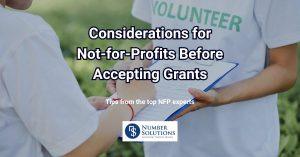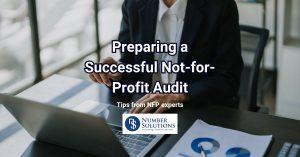» Not-for-Profit » Audit » Tips for Preparing a Successful Not-for-Profit Audit
Tips for Preparing a Successful Not-for-Profit Audit
Navigating the complexities of a not-for-profit (NFP) audit requires careful planning and attention to detail. Drawing from years of experience as a chartered accountant specializing in the NFP sector, I’ve compiled a comprehensive list of top tips to help your organization prepare effectively for a successful audit.
NFP’s Audit Requirement:
Not-for-profit businesses, aimed at social or environmental causes, often face audit obligations. ACNC-registered charities making over $250,000 annually must provide financial statements within six months. Grant-funded organizations may need annual audits regardless of revenue. Constitution requirements mandate audits regardless of income.
State regulations vary: NSW requires filings with Fair Trading; Victoria imposes audits over $1 million revenue; Queensland demands annual returns; Northern Territory has less stringent rules. ACNC registration necessitates annual reporting; ACT, SA, and Tasmania charities report to both ACNC and state regulators. In summary, audit requirements for not-for-profits vary by jurisdiction, revenue, and organizational structure.
Top 10 Tips for Preparing a Successful Not-for-Profit Audit
Here’s our researched and compiled list of 10 tips to ensure the success of your not-for-profit audit. Quickly check them out below.
#1. Establish Open Communication Channels:
- Foster proactive communication with your auditors from the outset to clarify expectations and timelines.
- Encourage regular dialogue to address any concerns or questions that may arise during the audit process.
#2. Know Your Reporting Requirements Inside Out:
- Stay informed about the specific reporting obligations applicable to your organization’s entity type and charitable status.
- Keep abreast of updates to accounting standards and regulations to ensure compliance with reporting requirements.
#3. Conduct a Thorough Review of Financial Records:
- Meticulously review your financial records to identify and rectify any inaccuracies or discrepancies.
- Pay close attention to year-end adjustments and ensure that all necessary accruals and provisions are accounted for accurately.

#4. Document Decisions and Judgments Methodically:
- Document all accounting decisions and judgments made throughout the financial reporting period.
- Maintain comprehensive records of the rationale behind these decisions to facilitate transparency and accountability.
>> Take Your Finances to the Next Level with Our Expert Not-for-Profit Accounting Services! Contact now.
#5. Prepare Robust Financial Statements in Advance:
- Develop shell financial statements well in advance of the audit to streamline the process.
- Ensure that all required disclosures and footnotes are included to provide a comprehensive overview of your organization’s financial position.
#6. Foster Collaboration Between Internal and External Teams:
- Cultivate a culture of collaboration between your internal finance team and the external audit team.
- Facilitate seamless information sharing and provide timely access to requested documentation to expedite the audit process.
#7. Seek Guidance from Accounting Experts When Necessary:
- Don’t hesitate to seek advice from accounting professionals with expertise in the NFP sector for complex accounting issues.
- Leverage their knowledge and experience to address any technical challenges and ensure compliance with regulatory requirements.
#8. Maintain Detailed Documentation Throughout the Audit Process:
- Keep meticulous records of all audit-related communications, actions, and decisions.
- Document any changes or adjustments made during the audit to provide a clear audit trail and support the integrity of your financial statements.
#9. Review Internal Controls and Processes Regularly:
- Regularly assess and update your organization’s internal controls and processes to strengthen financial governance.
- Identify areas for improvement and implement corrective measures to mitigate risks and enhance transparency.
#10. Embrace a Continuous Improvement Mindset:
- Adopt a mindset of continuous improvement to refine your audit preparedness processes over time.
- Learn from past audits and implement lessons learned to enhance efficiency and effectiveness in future audits.
Conclusion
By implementing these expert tips, not-for-profit organizations can proactively prepare for their audits and demonstrate a commitment to financial integrity and transparency. Effective audit preparedness is essential for maintaining stakeholder trust and ensuring the long-term sustainability of NFP organizations.
If you’re seeking assistance with the audit process, then you’ve come to the right place. Number Solutions Tax & Accounting is quickly emerging as one of the leaders in Australia for accounting services.
Related Articles:






